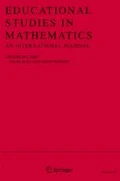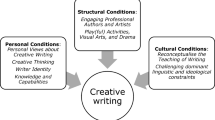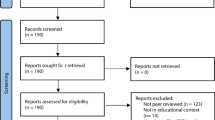Abstract
In this paper, we discuss the theoretical and methodological issues in exploring identity and agency within a narrative of choosing mathematics. Taking as our starting point Bakhtin’s emphasis on the dialogic space between interlocutors, we explore how an awareness of the addressivity and otherness of utterances, and of the role of genre and heteroglossia in self-authoring, can be used in the analysis of an interview to gain insight into one student’s narrative of choosing mathematics despite the fear that it held for her. We consider how our own research preoccupations with the role of gender and family discourses in learners’ relationships with mathematics played a part in the interview, and how the interviewee’s appropriation of, and resistance to, these and other genres can be understood as an assertion of agency within her particular narrative of choice.
Similar content being viewed by others
Notes
H: It was always the battle [kjempinga], that I had in a way wanted to do it [i.e. math] … it [the mathematics] was always in me, I always wanted to do it… to make it…. To get it [the fear] out of me because it [the mathematics] was in me in a way….
We use this spelling of didaktical to denote a meaning of the word which is different to its understanding in British English. This spelling indicates the German/Nordic usage which emphasises the holistic study of education including its ideological underpinnings.
It is appropriate to say here that the subject of gender and mathematics had recently been discussed in the master in mathematics education class.
H: Yes I put myself under pressure [by doing mathematics], I do that … but I don’t know the reasons for why it [the angst, struggle] became this way.
References
Atweh, B., Graven, M., Secada, W., & Valero, P. (Eds.). (2011). Mapping equity and quality in mathematics education. Dordrecht: Springer.
Bakhtin, M. (1981). The dialogic imagination: Four essays by M.M. Bakhtin. (C. Emerson & M. Holquist, Trans.). Austin: University of Texas Press.
Bakhtin, M. M. (1986). Speech genres and other late essays. (V. W. McGee, Trans.). Austin: University of Texas Press.
Black, L., & Williams, J. (2013). Contradiction and conflict between ‘leading identities’: Becoming an engineer versus becoming a ‘good Muslim’ woman. Educational Studies in Mathematics, 84(1), 1–14.
Braathe, H. J. (2010). Communicative positionings as identifications in mathematics teacher education. In V. Durand-Guerrier, S. Soury-Lavergne, & F. Arzarello (Eds.), Proceedings of CERME 6. Proceedings of the Sixth Congress of the European Society for Research in Mathematics Education (pp. 925–933). Lyon, France: Institut National de Recherche Pedagogique.
Braathe, H. J. (2011). Negotiating mathematics teacher identities. Paper presented at the Mathematics and Contemporary Theory Conference, Manchester, UK. Retrieved from http://www.esri.mmu.ac.uk/mect/papers-list.php
Braathe, H. J., & Ongstad, S. (2001). Egalitarianism meets ideologies of mathematics education—instances from Norwegian curricula and classrooms. Zentralblatt fur Didaktik der Matematik, 33(5), 1–11.
Cooper, B. (2001). Social class and “real-life” mathematics assessments. In P. Gates (Ed.), Issues in mathematics teaching (pp. 245–258). London: Routledge.
de Abreu, G., & Cline, T. (2007). Social valorization of mathematical practices: The implications for learners in multicultural schools. In N. S. Nasir & P. Cobb (Eds.), Improving access to mathematics: Diversity and equity in the classroom (pp. 118–131). New York: Teachers College Press.
Early, R. E. (1992). The alchemy of mathematical experience: A psychoanalysis of student writings. For the Learning of Mathematics, 12(1), 15–20.
Forgasz, H., & Rivera, F. (Eds.). (2012). Towards equity in mathematics education: Gender, culture, and diversity. New York: Springer.
Holland, D., Lachicotte, W., Jr., Skinner, D., & Cain, C. (1998). Identity and agency in cultural worlds. Cambridge, Massachusetts: Harvard University Press.
Holquist, M. (2002). Dialogism: Bakhtin and his world (2nd ed.). London: Routledge.
Martin, D. (2007). Mathematics learning and participation in the African American context: The co-construction of identity in two intersecting realms of experience. In N. S. Nasir & P. Cobb (Eds.), Improving access to mathematics: Diversity and equity in the classroom (pp. 146–158). New York: Teachers College Press.
Mendick, H. (2005a). A beautiful myth? The gendering of being/doing “good at maths”. Gender and Education, 17(2), 203–219.
Mendick, H. (2005b). Mathematical stories: Why do more boys than girls choose to study mathematics at AS-level in England? British Journal of Sociology of Education, 26(2), 225–241.
Mendick, H. (2006). Masculinities in mathematics. Berkshire: Open University Press.
Noyes, A. (2007). Mathematical marginalisation and meritocracy: Inequity in an English classroom. The Montana Mathematics Enthusiast, Monograph, 1, 35–48.
Rodd, M., & Bartholomew, H. (2006). Invisible and special: Young women’s experiences as undergraduate mathematics students. Gender and Education, 18(1), 35–50.
Solomon, Y. (2012). Finding a voice? Narrating the female self in mathematics. Educational Studies in Mathematics, 80(1–2), 171–183.
van Enk, A. A. J. (2009). The shaping effects of the conversational interview: An examination using Bakhtin’s theory of genre. Qualitative Inquiry, 15(7), 1265–1286.
Walls, F. (2009). Mathematical subjects: Children talk about their mathematics lives. Dordrecht: Springer.
Wertsch, J. V. (1993). Voices of the mind. Cambridge, Mass: Harvard University Press.
Winter, J., Salway, L., Yee, W. C., & Hughes, M. (2004). Linking home and school mathematics: The home school knowledge exchange project. Research in Mathematics Education, 6(1), 59–75.
Zevenbergen, R. (2001). Language, social class and underachievement in mathematics. In P. Gates (Ed.), Issues in mathematics teaching. London: Routledge.
Author information
Authors and Affiliations
Corresponding author
Rights and permissions
About this article
Cite this article
Braathe, H.J., Solomon, Y. Choosing mathematics: the narrative of the self as a site of agency. Educ Stud Math 89, 151–166 (2015). https://doi.org/10.1007/s10649-014-9585-8
Published:
Issue Date:
DOI: https://doi.org/10.1007/s10649-014-9585-8




